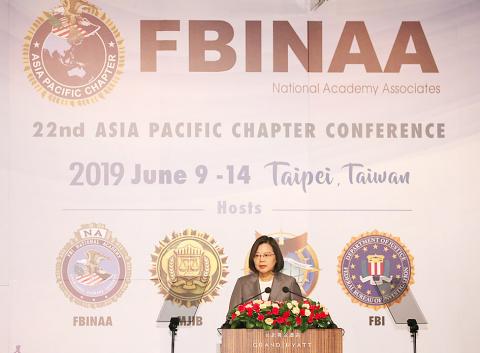President Tsai Ing-wen (蔡英文) and FBI Associate Deputy Director Paul Abbate yesterday opened a one-week FBI training program for senior law enforcement officers in the region, a course held in Taiwan for the first time.
The choice of Taiwan was “a testament to the nation’s importance to rule of law in the international community,” Tsai said at the launch of the FBI National Academy’s 22nd Asia-Pacific Chapter Conference.
“Taiwan is committed to achieving a free and open Indo-Pacific region,” she said. “We are working with like-minded partners throughout the world to make the region a safer and more prosperous place.”

Photo: CNA
Taiwan has signed memorandums of understanding on law enforcement with the US, the Philippines, Nauru and Palau, she said, adding that Taiwan’s intelligence-sharing networks stretch across East and Southeast Asia.
As a reliable partner and a force for good in the world, Taiwan is committed to combating international crime, she added.
Abbate told the conference that the FBI’s vision for the Indo-Pacific region excludes no one.
“We seek to partner with all law enforcement agencies that respect national sovereignty, fairness and the rule of law,” he said. “Our goal is for all nations to live in prosperity, security and liberty.”
Law enforcement must ensure that each country in the Asia-Pacific region is free to determine its own course, “even the smallest country,” said Abbate, the highest-ranking FBI official to ever visit Taiwan in an official capacity.
American Institute in Taiwan Deputy Director Raymond Greene said in his speech that despite Taiwan’s many contributions to the global community, it unfortunately is excluded from international bodies such as the WHO, the International Civil Aviation Organization and the International Criminal Police Organization (Interpol).
“In this interconnected world, Taiwan’s absence not only harms its 23 million people, but also increases risks to all countries,” he said.
That is why Taiwan’s participation in the FBI academy network is important to the world’s collective safety and security, Greene said.
This week’s conference in Taipei, which has about 170 participants from more than 20 nations, is a follow-up program for law enforcement officers who have participated in a 10-week course usually held in the US.
Officers from the Investigation Bureau and the National Police Agency have taken the course in the US since 1961, with about 36 of them graduating from the program, the Ministry of Justice said.
The FBI National Academy says it has trained more than 50,000 officers from around the world since launching its 10-week program in 1935.

SECURITY: As China is ‘reshaping’ Hong Kong’s population, Taiwan must raise the eligibility threshold for applications from Hong Kongers, Chiu Chui-cheng said When Hong Kong and Macau citizens apply for residency in Taiwan, it would be under a new category that includes a “national security observation period,” Mainland Affairs Council (MAC) Minister Chiu Chui-cheng (邱垂正) said yesterday. President William Lai (賴清德) on March 13 announced 17 strategies to counter China’s aggression toward Taiwan, including incorporating national security considerations into the review process for residency applications from Hong Kong and Macau citizens. The situation in Hong Kong is constantly changing, Chiu said to media yesterday on the sidelines of the Taipei Technology Run hosted by the Taipei Neihu Technology Park Development Association. With

CARROT AND STICK: While unrelenting in its military threats, China attracted nearly 40,000 Taiwanese to over 400 business events last year Nearly 40,000 Taiwanese last year joined industry events in China, such as conferences and trade fairs, supported by the Chinese government, a study showed yesterday, as Beijing ramps up a charm offensive toward Taipei alongside military pressure. China has long taken a carrot-and-stick approach to Taiwan, threatening it with the prospect of military action while reaching out to those it believes are amenable to Beijing’s point of view. Taiwanese security officials are wary of what they see as Beijing’s influence campaigns to sway public opinion after Taipei and Beijing gradually resumed travel links halted by the COVID-19 pandemic, but the scale of

A US Marine Corps regiment equipped with Naval Strike Missiles (NSM) is set to participate in the upcoming Balikatan 25 exercise in the Luzon Strait, marking the system’s first-ever deployment in the Philippines. US and Philippine officials have separately confirmed that the Navy Marine Expeditionary Ship Interdiction System (NMESIS) — the mobile launch platform for the Naval Strike Missile — would take part in the joint exercise. The missiles are being deployed to “a strategic first island chain chokepoint” in the waters between Taiwan proper and the Philippines, US-based Naval News reported. “The Luzon Strait and Bashi Channel represent a critical access

Pope Francis is be laid to rest on Saturday after lying in state for three days in St Peter’s Basilica, where the faithful are expected to flock to pay their respects to history’s first Latin American pontiff. The cardinals met yesterday in the Vatican’s synod hall to chart the next steps before a conclave begins to choose Francis’ successor, as condolences poured in from around the world. According to current norms, the conclave must begin between May 5 and 10. The cardinals set the funeral for Saturday at 10am in St Peter’s Square, to be celebrated by the dean of the College